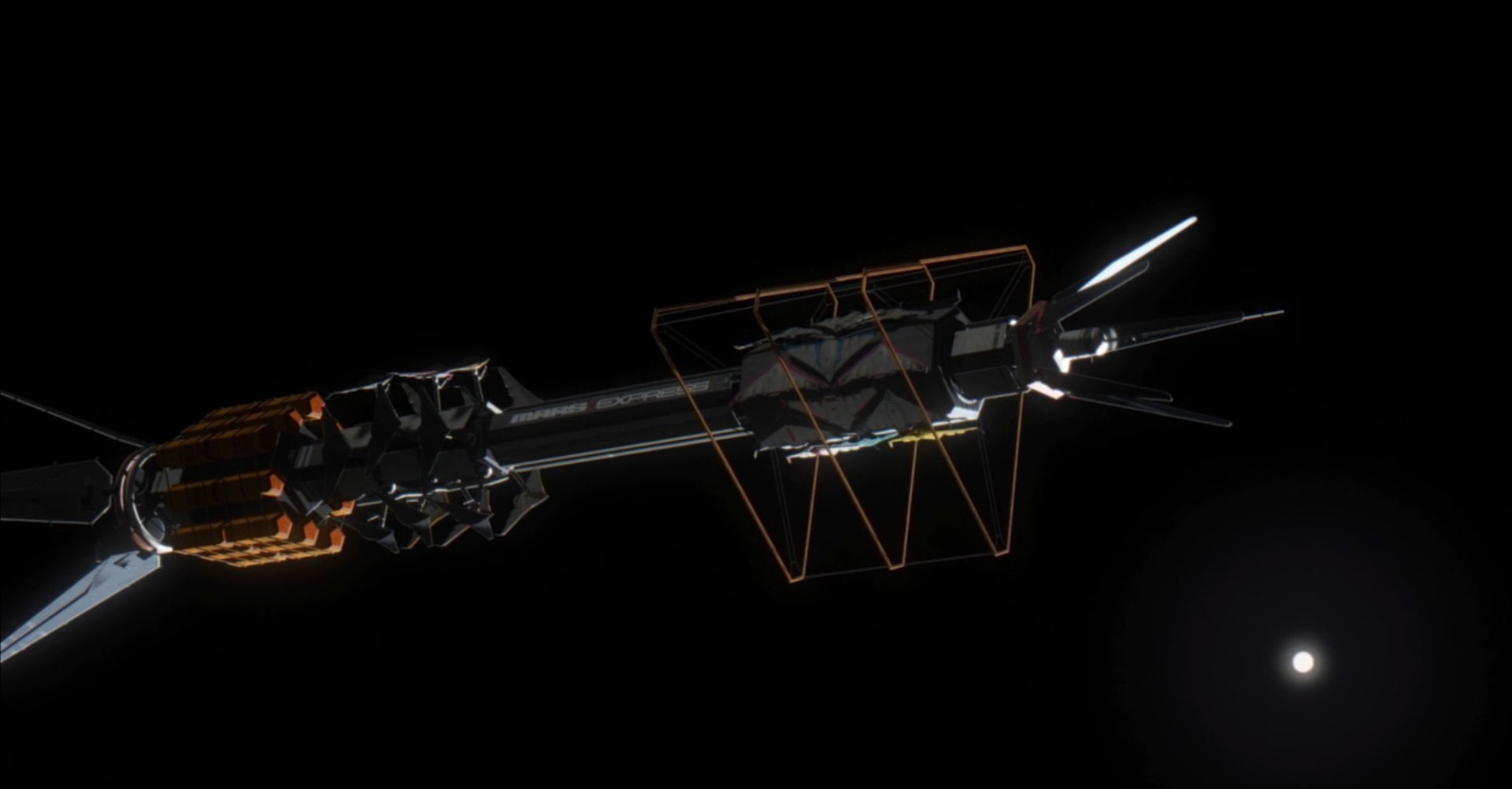A celebration of retrofuturism

Every now and then a movie comes along that, through no fault of its own, completely flies under the radar. We are talking about Mars Express, a movie that, on the surface level, is about a former soldier-turned-PI Aline Ruby who investigates the case of a missing student of the Alan Turing University on Mars. She is assisted by her partner Carlos Rivera, who was killed during a robot uprising at Novigrad. After his death, a "backup" was activated: A robot representation, containing the personality and memories of the original person.

And immediately a dozen questions come to mind. How do these backup personalities work? How are they being regulated, what are the laws governing them like? How do relatives and families deal with the fact that there's a robot who looks and talks like their late husband or father? Don't worry, these questions are explored within the framework of what starts as a simple detective story about a missing student.
Of course, the initial case quickly unravels into something much bigger. A big corporation appears to secretly move its pieces on the board, people who know too much tend to meet violent demises. The question of where computers end and AI-based intelligent life starts is front and center here. I won't spoil the plot, but suffice to say this movie is smarter than the "machines become smart and turn evil" dumbness of The Matrix.

But the story isn't the main attraction here. It's the world building. The way the future is depicted here is deeply rooted in a kind of retrofuturism that draw heavy inspiration from classics such as Ghost in the Shell (the first, animated movie, not the abysmal live action adaptation) and the highly recommended serialization Stand Alone Complex. This is a world in which we still have laptops, but they are super slim and fold like origami. We still have mobile phones, but they hover in the air using insect-like wings. We still use boxy diagnostic devices with buttons and dials but they measure CPU clock speeds in Petahertz.

Mars Express is not trying to predict the future. It is very much building its own world, with its own consistent rules and technologies. This is not a boring "dark metal corridors" world, but one where parts of Mars have been turned into a lush, bright and green place where the rich and famous, or those who rent out their bodies and minds to make enough cash, live luxurious, comfortable lives.

The music is unique and fitting. The subtle synthesizer-laden soundtrack is at times punchy and at times delightfully restrained, as appropriate for the scene. Our first trip into space is accompanied by the only truly suitable type of music for the occasion: A waltz. Best of all, the movie knows when to shut up. There is no constant background music, instead long stretches are given the space to breathe via excellent foley and ambience.

The animation is where the limited budget rears its head: The characters are definitely on the simpler side of things, with mostly flat shading that at times looks decidedly low-res. This may well be seen as an artistic choice, and the backgrounds are of a high quality so as to not make the movie look cheap, but for sure the cost had something to do with this decision. The german dub is atrocious, but luckily the english dub is excellent. Apparently the french original is a bit weird in places, but the only french word I know is croissant so... I guess it's a case of comme ci, comma ça.

It is obvious that scifi manga had a huge influence here. But this is more than a tribute to 1980s animated scifi. Mars Express does its own thing, it has its own story to tell, and in its own way.
If you're hoping for a grand finale that has the good guys win and the bad guys lose, this ain't it. This is a french production, after all. The movie's plot is mostly strong, with only one part where some voice exposition was inserted, probably late in the production. For the most part, the adage "show, don't tell" is being followed well, and the viewer is treated like an intelligent being. We don't need to know exactly what happened at Novigrad, and we are certainly not being shown what happened. A lesser movie would have inserted a terrible flashback. Some may find the lack of explicit explanation of some of the plot points annoyingly opaque, but the fact of the matter is the viewer is not privy to everything that happens, we experience the story following Aline on her investigation, and only over time the things that happened off-screen are unraveled, sometimes only by observing the ultimate consequences. I wouldn't say that this is the most intelligent script every written, but is smarter than most and it does demand attention on behalf of the viewer.

There are so many memorable scenes that will lodge themselves in your brain because of their fantastic direction and constant barrage of worldbuilding via fun and inventive technologies and gadgets. If after watching the movie someone asks you what you thought of "the highway scene" or "the dorm investigation scene", you will know exactly what scene is meant.

The movie flopped in theaters. On a budget of 9 Million Euro, it made only 1.5 million dollars according to IMDB. This was defintely due to a complete lack of marketing and very few theaters actually playing it.
And what a shame this is. Mars Express is truly an overlooked gem, a creative vision brought to life with care and attention, with a fantastic world and technology that is both futuristic and reminiscent of the bygone world of Sony VCRs. The soundtrack will drill earworms into your brain and the ending will stay with you long after the movie is over.
